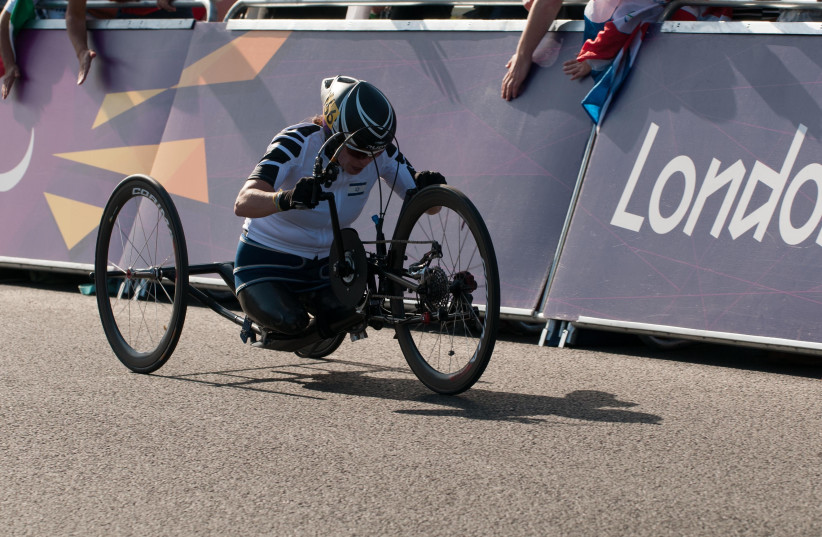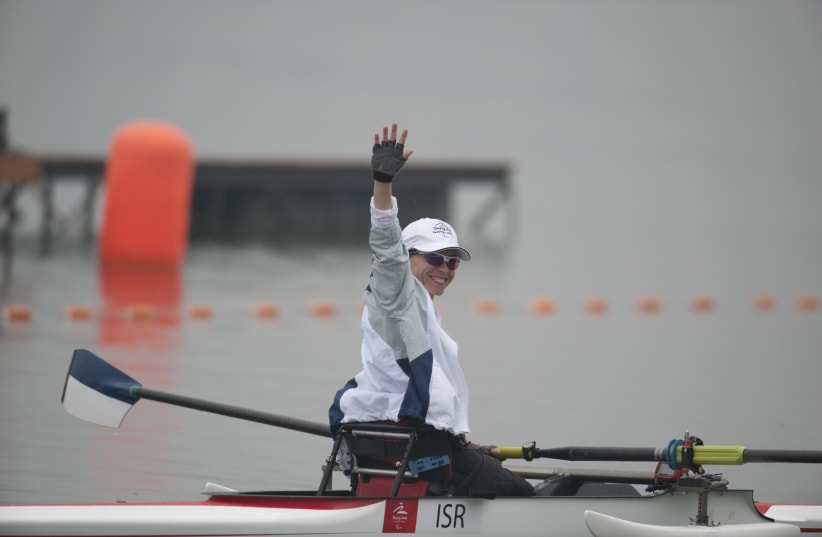When Pascale Bercovitch made aliyah from France at age 17, she had no money, no friends, and no legs. But the always upbeat Bercovitch arrived with a positive attitude, determination to serve in the IDF, and a firm commitment from the esteemed Brig.-Gen. Aharon Davidi to make that happen – even if she was a recent amputee.
Now, the 54-year-old Tel Aviv resident is a seasoned Paralympian, motivational speaker, writer, mother of two and very happy longtime Tel Aviv resident. The Paralympic medalist, who has participated in three sports – handcycling, rowing and kayaking – over four Paralympics, recently returned from the Paralympics in Tokyo. Back home, she is also a local hero at the boathouse along the Yarkon River, and an advocate for accessibility and for people with disabilities in general.
 Learn how to buy your home in Israel with confidence >>
Learn how to buy your home in Israel with confidence >>Bercovitch took off 10 days to rest after returning from the recent Tokyo Paralympics, then immediately got back in her kayak. “I have to paddle! It is like with hunger – a person has to eat!”
She is still seriously considering competing in the 2024 Paralympics, which are to be held in Paris, not far from where she grew up. For now, Bercovitch has been good to herself. “I am training daily but doing one instead of two workouts a day.”
Bercovitch has many projects on her to-do list. “I have a lot to do, including a book about my life.”


She is also a sought-after motivational speaker. And she wants to spend more time with her daughters – 12-year-old Mica will soon celebrate her bat mitzvah, and 20-year-old Eden, who is a soldier with elite sports status. Eden just so happens to excel in the same sport as her mother – rowing, and is a member of the Israeli National Kayaking Team.
Bercovitch’s interest in Israel is remarkable, given how little she knew about Judaism or Israel growing up in France.
She was born in France to two parents who were also born in France. She was a good student, and enjoyed literature and French culture. Despite her strong French upbringing, she recounts, “I had a feeling from a young age that I didn’t fully belong to France, but I couldn’t say why.”
The precocious and contemplative Bercovitch was always thinking of ways to positively impact the world. “From age 13, I dreamed of living in a new country and building it.”
She had a sense that France was already “set,” and that there was little she could do to effect change. Everything in France and Europe is stuck, she thought, and turned her sights to other places in the world, including Africa.
She secretly began sending her weekly allowance money (“meant for things like buying croissants!”) to Doctors Without Borders. “My parents eventually discovered it when I started getting mail from the organization!”
As Bercovitch dreamed of living in another country and helping the local people, she was hearing stories from her father of the hardships people living in Communist countries were experiencing. He spoke of relatives who had lived in Poland and Romania, and he explained about life in Soviet countries.
“I wanted to go there. I wanted to change the world,” offers Bercovitch.
HER LONG journey to Israel started at age 15 when she chanced upon a Jewish radio program by Gérard Benhamou. “I began to listen to the Jewish radio. We had one frequency for Jewish radio in French; we do until today. I secretly listened to the program three times a week, under my blanket at night!” reports Bercovitch. “I knew I am half Jewish, but didn’t know what it means. Suddenly, I heard about this small country that has a very big vision and I thought, okay, I am also small and I also have a big vision.”
Bercovitch notes that her identification with Israel was in its early stages and she was very excited when Benhamou had a special guest – Brig.-Gen. Aharon Davidi, speaking about his new Sar-El program.
“We are inviting guests, Jewish or not, to have a three- or four-week experience in the army – and we pay for the ticket,” said Davidi.
Bercovitch was trying to recall whether the program paid for all or part of the ticket. But she vividly remembers her reaction to hearing Davidi speak. “I felt like I got a big boom on my head from a hammer – I jumped from bed, got a pen and paper to write down the contact information, and called the next day.”
She was disappointed to learn that she needed to be 19 but was not discouraged. “I won’t wait a year and a half!”
Bercovitch told her parents some of the story of the opportunity that potentially awaited. “I told my parents I found a way to have a free holiday abroad. I told them I was too young, but I didn’t tell them it was for Israel.”
Her parents, knowing how mature and beyond her years Pascale was, said that they would explain to the program organizers that she was “not a usual kid!”
BERCOVITCH MADE her first trip to Israel at age 17. “I didn’t want to come as a tourist – I wanted to come and help!”
She loved the experience and was overjoyed when Davidi came to visit France. Davidi, who died in 2012, was the head of the IDF Paratrooper and Infantry Corps, became the director of Community and Cultural Activities of the Golan and Jordan Valley, and was the founder of Sar-El. He came to France and told Bercovitch, “I heard you were the youngest on the program!”
She shared her passion for Israel and her desire to one day serve in the army. “He loved me! He gave me his business card and said, ‘If you come, I want to help you.’”
Then she experienced the unimaginable: On her way to school one wintry day when she was 17, she slipped on ice at a train station and was pulled under a train. The driver did not see her as it was early morning. As Bercovitch waited for help to arrive, she realized both of her legs had been severed at the thigh.
In spite of this life-altering event, Bercovitch set her sights on Israel. “I told my mother, ‘Please call Sara-El and tell them I’m going to be a little late [in coming to Israel and to the army].” She adds, “The accident was in December 1984, and I had a secret plan to start the army in 1985. My mother did not know what she was doing.”
To this day, Bercovitch is amazed and appreciative that Davidi came to visit her in the hospital in Paris in March 1985. “I remember it was snowing. He was a very special, generous and very tough man. I called him Paddington since he had a kova tembel [round, brimless hat] and a big beard.
“He said, ‘I heard about the accident, and despite having no legs, you are always welcome.’ He said he was ready to keep his word and wanted to help me. It was one of the best days of my life!”
She continues, “Six months after the accident, I called him and said I am coming. He asked if I was done with my treatment. I said yes. I lied! He knew. I took a ticket and flew from Paris to Tel Aviv.”
Bercovitch’s army service was a little mundane, though useful for a new olah acclimating to life in Israel. “I was preparing coffee and food. It was boring, but I learned Hebrew!”
She also reports that she spent her time in the army learning about the language, the culture of Israel, and the realities of her new physical condition.
After her army service, Bercovitch had a successful journalism career and split her time between Israel and France. “I traveled a lot and had two apartments – one in Tel Aviv and one in Paris.”
Thanks to Davidi, Bercovitch was also introduced to sports. “He arranged for me to do sports at the pool two times a week, and I was on the national swim team.”
Bercovitch then became a motivational speaker. She can’t stop speaking about Davidi. “He opened the army gates to paraplegics. All that I am today is because he believed in me.”
As Bercovitch looks back on her many years in Israel, she is pleased with all that she has accomplished, yet she remains honest about the many challenges she has faced.
“I had to always be inventive and manage. It was very tough. When I got here I had $100, a suitcase and wheelchair. I had no family support. I was 17. I was totally alone. And nothing was accessible 37 years ago. There were stairs everywhere!”
Even when Bercovitch became a Paralympic athlete at age 40, she faced challenges. “They said I was too old to do anything. And there was no money! No financial support and no psychological support.”
She has thus far managed to complete in four Paralympic games, and she just might go for her fifth. “I am not saying I won’t be in Paris [for the next Paralympic Games]. I may!”
For now, Bercovitch enjoys being a mother to her two daughters, and takes being a role model for disabled and nondisabled athletes very seriously. “People know me, and it is an amazing feeling. For example, recently a class of 10-year-olds with their teacher stopped at the boathouse and said, ‘This is Pascale!’ It is worth it to be a model to these kids. I bring the values of what I am able to do. I am aware of what I can bring. I want people to identify, to understand, to react properly.”
Bercovitch concludes, “I love Israel. I love the people, the weather and the sea. My kids are fully Israeli and thank me for raising them here. I love everything – except for the bureaucracy!”
 Sign up for our newsletter to learn more >>
Sign up for our newsletter to learn more >>